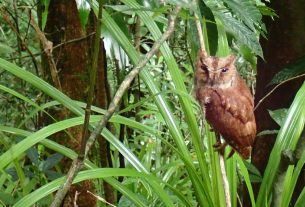Journal of Applied Ecology offers a two-year mentoring opportunity for early career researchers to gain experience of the Associate Editor role. Each mentee works with one of our five Senior Editors, who act as a mentor, as well as receives on-going support from the Editorial Office. Mentees have a great opportunity to learn more about the peer review process and publishing more widely through handling submissions to the journal.
We’re thrilled to welcome five new Associate Editor mentees to the Journal of Applied Ecology Editorial Board. Get to know them below!
Raquel Carvalho
Universidade de São Paulo, Brazil
Raquel is currently developing a project to understand the role of environmental factors and the introduction of exotic species in the propagation and risk of transmission of zoonotic diseases. Her research expertise lies at the interface between biodiversity ecology and ecosystem conservation, especially in tropical areas. This involves understanding the consequences of human-driven disturbances, climate-related stressors and landscape structure on biodiversity and ecosystem functioning. More recently, her interests have also focused on synthesis research about Amazonian terrestrial and aquatic biodiversity, to help the process of decision making.
Aashna Sharma
Wildlife Institute of India, India
Aashna is a freshwater ecologist who has worked on assessing the impacts of climate change and biological invasions on Himalayan freshwater fauna. Her interests entail leveraging machine learning to explore spatial trends in the ecology of riverscapes and their biodiversity. She is currently building a project on pan-Indian riverscape conservation by assessing the combined effects of climate and land-use changes on freshwater megafauna. Website.
Nahuel Policelli
IPEEC CONICET, Argentina
Nahuel combines greenhouse bioassays, fieldwork, molecular biology, and bioinformatics to try to understand the role of soil microbes in ecosystems, with a special interest in the role of mycorrhizal fungi as drivers of plant invasions. One of the main questions Nahuel is exploring is whether the invasiveness of microbial symbionts could explain the invasiveness of plants. He is also interested in how interactions between soil microbes shape nutrient cycling in forests, and in the use of mycorrhizal fungi in restoration ecology.
Kflay Gebrehiwot Yaynemsa
Samara University, Ethiopia
Kflay has a PhD in plant biology and Biodiversity Management from Addis Ababa University, Ethiopia, and is a plant ecologist. He is currently serving as an Assistant Professor at Samara University where he is working on the invasive Prosopis juliflora in the Afar desert and semi-desert ecosystem. He is particularly interested in restoration ecology.
Karen Castillioni
University of Minnesota, USA
Karen is a plant ecologist passionate about understanding the complex relationship between biodiversity and ecosystem function across spatiotemporal scales and how this relationship is modified by climate change. Through her research, she explores how the loss of alpha and beta diversity can affect ecosystem productivity and the mechanisms behind it. Karen uses a combination of field experiments, remote sensing and existing data to answer pressing questions in ecology. Website.
If you’d like to find out some more information on the scheme, please click here.





